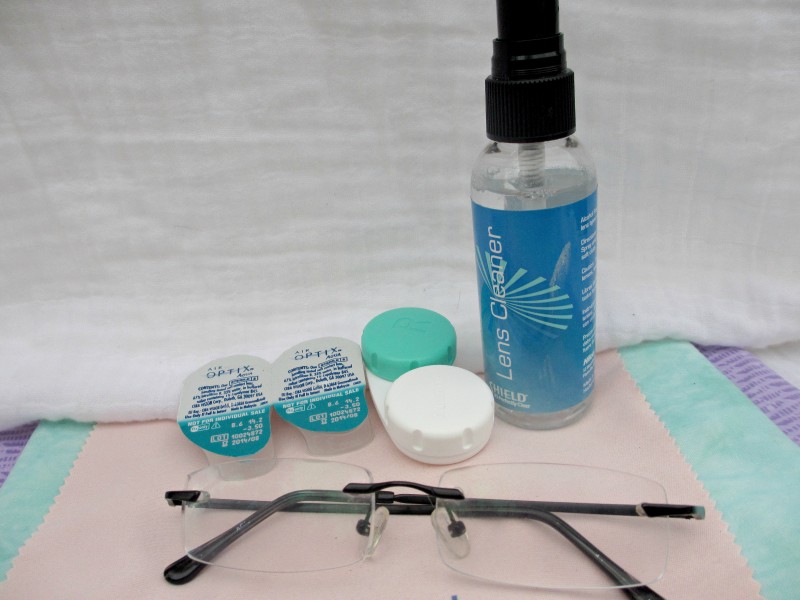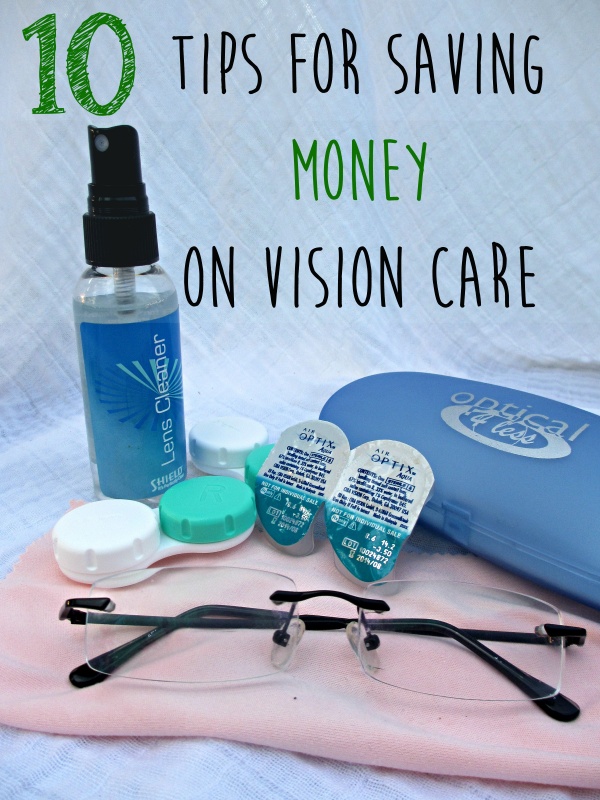
*I was provided with an Optical 4 Less gift card. All opinions are my own.
I was in seventh grade when I started wearing glasses full-time. I was still immature enough that I was pretty rough on my glasses for the first few years, so I had “accidents” with several pairs. I remember being surprised how my glasses cost over $300 once. We never paid for any “upgrades” like tinted lenses or anti-glare coating. So, that sounded like a lot of money to me when I was a young teenager. The first few years that I had glasses, I think the longest I had a pair before breaking them or losing them was about six months. While $300 for glasses sounded like a lot as a kid, it wasn’t until I was 18 and on my own without vision insurance when I truly gained appreciation for how much vision costs really are. Since then, I’ve learned several “tricks” that have helped me (and Ryan, who also requires vision correction) save money on our vision care expenses.
1. Wait for a deal on the vision test. The vision test is unavoidable, you have to get an exam regularly so that you know your prescription. But, you don’t have to pay full price. Sign up for emails or the mailing list for an eye doctor in your area so that you’ll get sent coupons or information about discounts or deals. This time of year is often a great time to find a deal on contact lenses online because deals are a run for kids going back to school but they don’t usually have an age limit so adults can take advantage as well.
2. Consider how long your contacts last. Some contacts are daily, others weekly or monthly. When you’re comparing the cost of your contacts, be sure to consider how long each box will last you instead of just comparing the cost of one box to another.
3. Try various brands of contacts and solution. Some eye doctors will try to start you out with the biggest brand name of contacts out there. Why not ask to try the lesser known, cheaper brands? My eye doctor let me try brands for a few days at a time free of charge so you don’t really have anything to lose. If your eyes can tolerate cheaper contacts, there’s no reason to be brand loyal. Go with what saves you money.
4. Try cheaper brands of contact solution. If your eyes are sensitive, try to find coupons for the brand(s) that do work for you.
5. Choose glasses over contacts. If you aren’t really passionate about wearing contacts, choose glasses instead. If you shop around for glasses, they will definitely be cheaper than the cost of contacts.
6. Order glasses online. As I mentioned earlier, buying glasses from my eye doctor usually cost $200-$300 without any “Add ons”. Online glasses retailers often have a wide range of prescription glasses for $75 or less. I’ve been ordering my glasses online for over five years now and have been really happy with the quality for the price. Ryan is picky about his glasses and couldn’t find a pair that he liked at the sites we usually order at so we tried Optical 4 Less for the first time. I was a bit nervous about ordering because the glasses ship from Hong Kong but our order went through without a hitch. I loved how we could pick out his frames and customize the lens shape. The glasses are just as sturdy as glasses we’ve ordered from eye doctors in the past. If you have a pair of glasses that you know the measurements to, you will know exactly what size glasses to order so here is little risk of them being the wrong size. Many prescription glasses have a set of 3 numbers on the ear piece, these are the measurements you want to use.
7. Wait for buy one, get one deals. Even online retailers usually have coupons or deals going. If you are rough on your glasses and worry about breaking them, wait for a BOGO deal so you can order two pairs for the price of one and have a back up. BOGO deals are great for families with multiple people who require glasses.
8. Consider the add-ons. Which ones do you truly need? Ryan’s prescription is high so he truly needs to pay for the thinner lenses for his glasses. Other add-ons like transitional lenses and anti-glare coating aren’t necessary for us. However, add-ons like anti-scratch coating might be a smart purchase if you’re rough on your glasses. Just make sure you think through which add-ons make sense for your situation and which ones don’t.
9. Save your old pair as back up. I like to donate my really old frames (there are tons of great charities that accept glasses – google to find some in your area) but I always hold on to my most recent old-pair. You never know when yours will accidentally break. I rely on my glasses full-time so I need to have a backup just in-case. Having a back up allows me to avoid extra fees like rush shipping if I do have an accident and have to order a new pair.
10. Take care of your glasses. Keep a case in your purse so that you have a safe place to put your glasses if you need to take them off. Use glasses cleaner or a glasses cleaning cloth on your lenses instead of your shirt or paper towel. Cleaning your glasses properly will prevent them from being scratched.
Do you require vision correction? How do you save money on your vision care needs?
Hi there! I am Emily Evert, the owner of Emily Reviews. I am 28 and live in a small town in Michigan with my boyfriend Ryan and our two pugs. I have a large family and I adore my nieces and nephews. I love reading memoirs, and learning about child development and psychology. I love watching The Game of Thrones, Teen Mom, Sister Wives and Veep. I like listening to Jason Isbell, John Prine, and other alt-country or Americana music. I created Emily Reviews as a creative outlet to share my life and the products that I love with others.
This post currently has no responses.




Leave a Reply